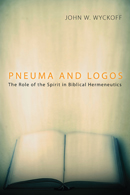John W. Wyckoff: Pneuma and Logos
 John W. Wyckoff, Pneuma and Logos: The Role of Spirit in Biblical Hermeneutics (Eugene, OR: Wipf & Stock, 2010), 168 pages, ISBN 9781608994830.
John W. Wyckoff, Pneuma and Logos: The Role of Spirit in Biblical Hermeneutics (Eugene, OR: Wipf & Stock, 2010), 168 pages, ISBN 9781608994830.
John Wyckoff’s 1990 Ph.D. dissertation has finally come to print and is long overdue. In fact, it is perplexing how a scholarly treatise on such an intriguing topic was not snatched up by a publishing house in search of book candidates on controversial topics of perennial interest. Pneuma and Logos is just such a book. It sharply focuses on a hermeneutical question that has commanded the attention of church fathers and theologians from the earliest times of theological reflection in the Church. Simply put the question is, “Does the Holy Spirit have a role to play in the interpretive process called hermeneutics?” A necessary follow-up question, if the first is answered in the affirmative, is “How and to what extent does the Holy Spirit facilitate a person’s understanding of the Scriptures?”
Scholars and teachers interested in biblical hermeneutics are well aware that the central focus of this book is one well worth considering, if for no other reason than the Bible itself raises the question in passages like 1 Cor 2:10-15 and 2 Cor 5:5-17, not to mention John’s gospel where the “teaching” function of the Holy Spirit is amply attested. Oddly, seldom do hermeneutical textbooks contain a substantive treatment of the question at hand. In his introduction to the problem, Wyckoff describes a paradox. Scholars representing a wide spectrum of Christian tradition recognize the importance and challenges of biblical hermeneutics. Many of these hold to a high view of Scripture as the inspired Word of God and posit an active role of the Holy Spirit in its production. Yet pneumatology has received short shrift when it comes to hermeneutical reflection. Our author seeks not only to speak to this neglect, but make a major move toward remedying it.
In the space of five compact and well constructed chapters, Wyckoff conducts a historically-informed exercise in philosophical theology around the issue of the Holy Spirit’s relationship to biblical hermeneutics. Chapter one clearly states and defines the nature of the problem, establishes the need for the present study, circumscribes its scope and describes its internal organization. Admittedly the complex and multifaceted character of hermeneutics will raise a host of issues and questions beyond the scope of this book, but the author is determined to stay focused on the primary question which he argues deserves our singular attention.
Chapter two surveys the history of biblical interpretation from Early Church to the Reformation; the Reformation to the Enlightenment; and the Enlightenment to mid-twentieth century.
As a teacher I thoroughly enjoyed this helpful historical survey of the Church’s consideration of the Holy Spirit’s relationship to hermeneutics because it also serves as a primer to the field of historical hermeneutics in general. It provides a needed supplement to most textbooks in hermeneutics. Wyckoff conducts an overview of the major schools of biblical interpretation, their major figures and a succinct statement of their contribution to the field. Students will especially appreciate the summaries that appear after each historical period and the author’s conclusions at the end of the chapter. He lingers over major figures such as Origen, Chrysostom, Augustine, Aquinas, Luther, Calvin, Turretin, Schleiermacher, Barth etc. to highlight their specific contributions to hermeneutics and specifically how they related the Spirit to a believer’s understanding of Scripture. Numerous choice quotes from the early Church Fathers and theologians demonstrate their high view of Scripture owing to their conviction of its divine origin and inspiration. It is this theological conviction which naturally led to their hermeneutical consideration of how the Holy Spirit continues to function as a mediator of Divine truth through the Scriptures. Nevertheless, while most affirmed this role of the Holy Spirit, some denied or deemphasized it. The author provides sharp insight into why this was so by revealing the theological, philosophical and epistemological presuppositions at work.
Category: In Depth, Pneuma Review, Spring 2012


